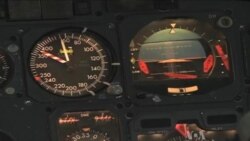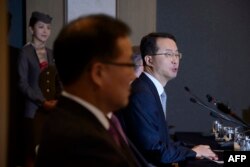WASHINGTON —
After a deadly crash landing last summer in San Francisco, Asiana Airlines is changing its training for pilots to encourage crews to talk more and change cockpit culture.
A U.S. investigation found that corporate culture may have been an issue in lthe crash.
"It's a reality that within our country there is a leaning toward a patriarchal culture and many pilots work and fly within the strict military order," Asiana's chief executive Kim Soo-cheon said this week at a press conference in Seoul.
Asiana Flight 214, a Boeing 777, crashed on landing on a runway in July. Three people died and 180 were injured.
The following month, VOA was the first to report that the crash could be linked to a culture of "cockpit hierarchy." That's when one pilot defers to a senior officer, even if the junior pilot fears imminent danger.
A U.S. National Transportation Safety Board hearing on the crash in December showed that one pilot did not feel he had the authority to abort the low and slow landing.
And now, Asiana airlines is changing the way it trains pilots.
South Korea’s second-largest airline will encourage a friendlier culture in the cockpit, instead of one based on airline seniority, military status or age.
“Why would you have two pilots in the airplane if they aren’t going to talk to each other?” asked David Kirstein, who works in aviation regulatory law. He’s not surprised by the new training.
“There’s probably pressure from the U.S. aviation officials, the NTSB, or their own government," he said. "And there may be a fall-off on traffic. Consumers are worried. If people aren't flying that would be the most motivating factor there is.”
Kirstein said other airlines should take note of Asiana’s improvements and understand the importance of open communication in the cockpit.
A U.S. investigation found that corporate culture may have been an issue in lthe crash.
"It's a reality that within our country there is a leaning toward a patriarchal culture and many pilots work and fly within the strict military order," Asiana's chief executive Kim Soo-cheon said this week at a press conference in Seoul.
Asiana Flight 214, a Boeing 777, crashed on landing on a runway in July. Three people died and 180 were injured.
The following month, VOA was the first to report that the crash could be linked to a culture of "cockpit hierarchy." That's when one pilot defers to a senior officer, even if the junior pilot fears imminent danger.
A U.S. National Transportation Safety Board hearing on the crash in December showed that one pilot did not feel he had the authority to abort the low and slow landing.
And now, Asiana airlines is changing the way it trains pilots.
South Korea’s second-largest airline will encourage a friendlier culture in the cockpit, instead of one based on airline seniority, military status or age.
“Why would you have two pilots in the airplane if they aren’t going to talk to each other?” asked David Kirstein, who works in aviation regulatory law. He’s not surprised by the new training.
“There’s probably pressure from the U.S. aviation officials, the NTSB, or their own government," he said. "And there may be a fall-off on traffic. Consumers are worried. If people aren't flying that would be the most motivating factor there is.”
Kirstein said other airlines should take note of Asiana’s improvements and understand the importance of open communication in the cockpit.






